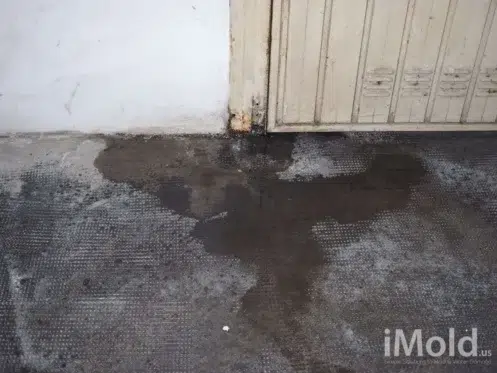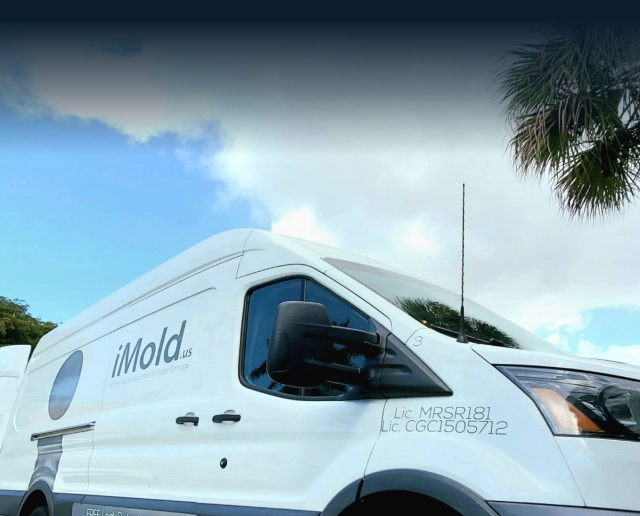Mold growing in a garage can be pesky but there are steps you can take to prevent it. The rainy season will be here before we know it and this is the time of year to watch out for mold. In Southwest Florida, we have gained the knowledge of managing our lives around the rain. But what happens to the areas we tend to forget about during this season? More than likely, the copious amount of rain will cause unwanted flooding or water damage.
Garages, both attached and detached, are high-risk flood areas of your home. The architectural design of garages consists of a large enough door to fit a vehicle. With an entry of this size, the amount of water that can damage a garage is concerning for homeowners. Many homes in Southwestern Florida, such as Bonita Springs, have two-car attached garages. With garages of this size and style, the chance of water damaging your garage and home is worrisome. When water damage is present, mold isn’t too far behind! Once water enters an area, it is crunch time before mold growth begins to overtake. Any savvy homeowner would take precautions to protect their garage and housed vehicles. But what precautions are best to take to prevent mold from invading your garage this season? Stick with us as we explain the top prevention tips to use this Florida rainy season.
Properly Seal your Garage Door
No matter the amount of money that you pour into a new garage door, it seems the seal never fits appropriately. Without a tight seal against the garage door to the ground, water can easily slip into the garage. Purchasing a weather barrier strip (also called a flood barrier strip) increases protection. These barriers, usually 1.5 inches thick, run across the lower perimeter of the garage’s weak point. The new wall and seal will help to keep unwanted water from entering the garage and wreaking havoc. These barriers are easy to install and save money down the road. Remember- prevention is better than remediation!
Inspect And Correct
Take the time to inspect your garage and surrounding areas deeply. Look for spots that can cause the most harm and write them down. Worrisome spots to look for may include, but are not limited to:
Gutters:
How close are the drains to the garage? If the gutters are empty near the garage door, add an extension piece to direct water away. This will keep water from backing up during the harsh rainstorms here in Florida.
Are your gutters full? Many forget to clean out their gutters. Full gutters cause water to drain off the gutter and collect in areas around the home. This is a common problem that leads to garage and house floods and water damage.
Garage Roof:
While we particularly focus on the roof above the garage, we encourage you to inspect the roof as a whole as well. Check for cracks, dips, or swelling. Any of these can show signs that there is already damage that has begun. If damage like this is present, we recommend contacting a professional mold inspector. A mold inspector will be able to look deep into the structure of the home and find any mold intrusion. Should you find a simple leak or crack to fix yourself, act immediately to limit the risk of damage to the garage.
Pipes:
Similar to that of the gutter, examine pipes for leaks. Leaky pipes are one of the top causes of mold growth in homes. Mold thrives in warm moist areas, and a leaky garage pipe fits these criteria perfectly. If you are unable to fix the pipe leak yourself, enlist the help of a trusted plumber to finish the job. If you find yourself facing pipes that have burst, you may find the following article helpful, “My Pipes Burst, Now What?”
Humidity Control
In the Floridian climate, humidity control in the garage is a vital key in mold prevention. To control humidity in most homes, the thermostat has a humidity setting. Another way to combat mold on cooler days is to open windows and allow natural light and a cool breeze into the home. However, here in areas such as Fort Myers, the humidity from the ocean air can reverse the desired effect. Try opening the garage door for an hour or so during the day to release some of the stuffy air from the garage. While this trick may work, we understand that when it comes to the rainy season leaving the door open is risky. For a more permanent solution, we recommend purchasing a dehumidifier.
A dehumidifier in your garage will decrease the level of humidity with little to no effort from you. To utilize a dehumidifier with no maintenance, purchase a tankless dehumidifier. Dehumidifiers with tanks will collect moisture in the air. The extra water molecules it collects are then pushed into the storage tank. When the tank becomes full, it becomes your responsibility to empty the tank. When the tank refills, you must empty it again, over and over. However, with a tankless dehumidifier, a hose takes over the role of the tank. Place one end of the tube into the machine and the other into a drain (most garages have drains on the floor). When the condensation builds up from the humidity collected in the air, the water then drains. This method becomes a truly maintenance-free humidity control for your garage.
discovering
Reduce or Eliminate Landscaping Nearby
Many homes in the Fort Myers and Naples area tend to have Home Owner’s Associations. For this reason, the landscaping is always kept up and looking pristine. While this may be wonderful for curb appeal, take a second to rethink the placement of your plants.
Plants of all kinds (trees, shrubs, flowers, etc.) all have roots and necessities. One of the main necessities of survival for plants is water. The roots and water content create risky situations for the integrity of your garage.
When large plant roots grow to support the growing plant, they become stronger. Unbeknownst to some, plant roots are capable of growing into the housing structure. This includes the structure of your garage. When this phenomenon occurs, cracks in the structure occur. Cracks and leaks are secondary to the main issue of roots pushing away at the foundation. Not only will this create massive liability for collapse, but also a weak point easy for flooding. Should this occur, the risk is high for mold growth and water damage within the structure of the garage and home.
Prevention is always better than remediation. However, should you find yourself in a place of water damage and mold this rainy season, call us! At iMold, we specialize in mold removal, mold remediation, and water damage. Our trained technicians will help ease the pain that the season has caused. In addition, our experienced team will assist you in the origin of your damage.
Call us today to make an appointment! And be sure to like and follow us on Facebook, Instagram, and Twitter for the latest iMold news and deals!

